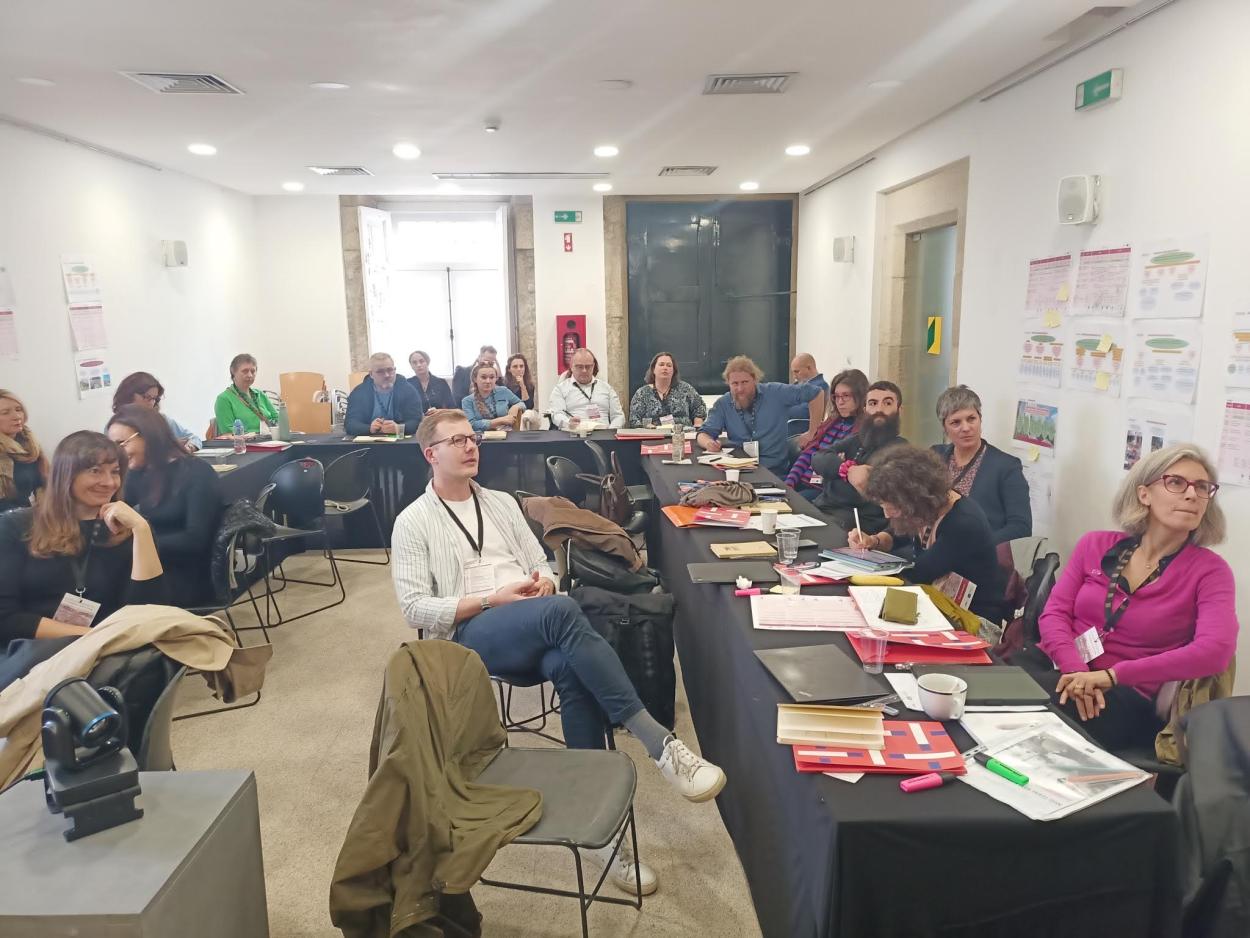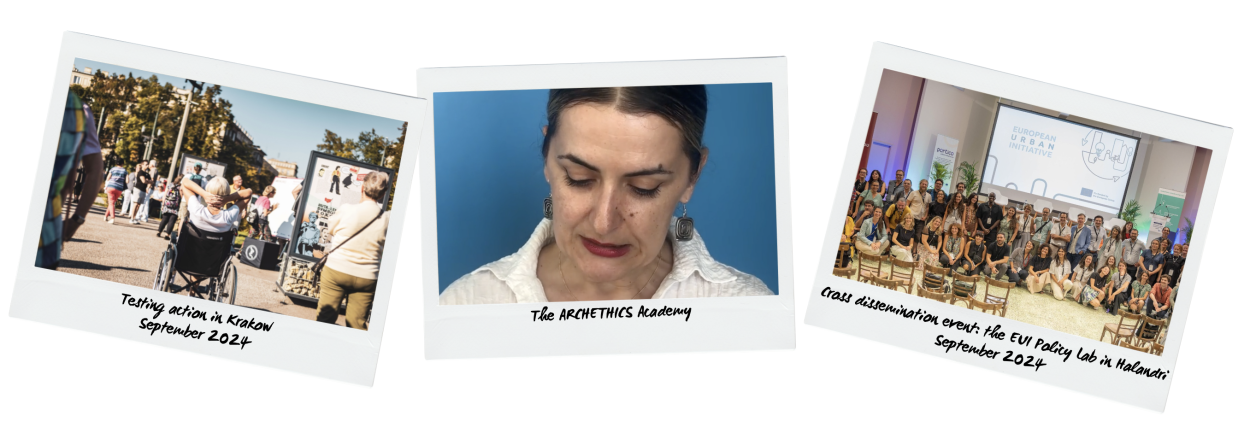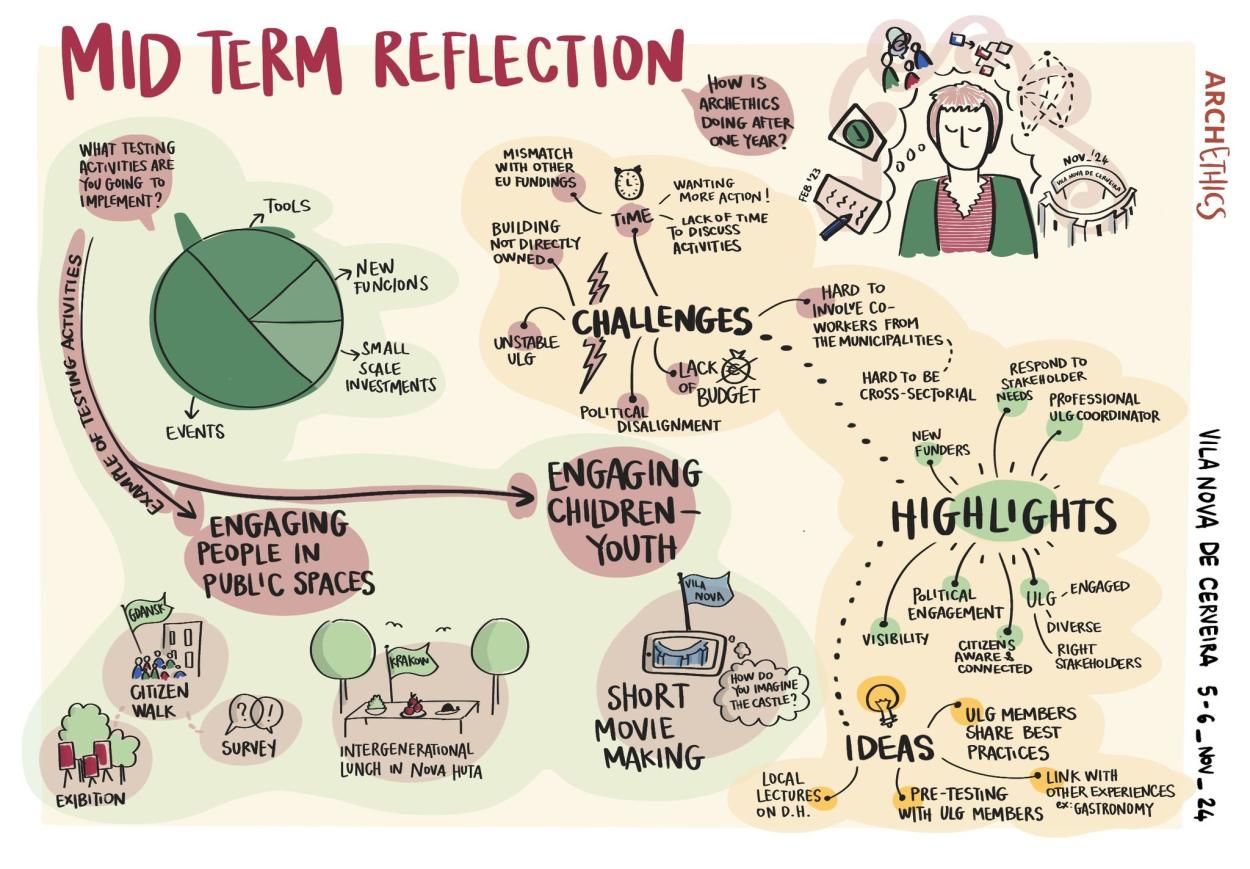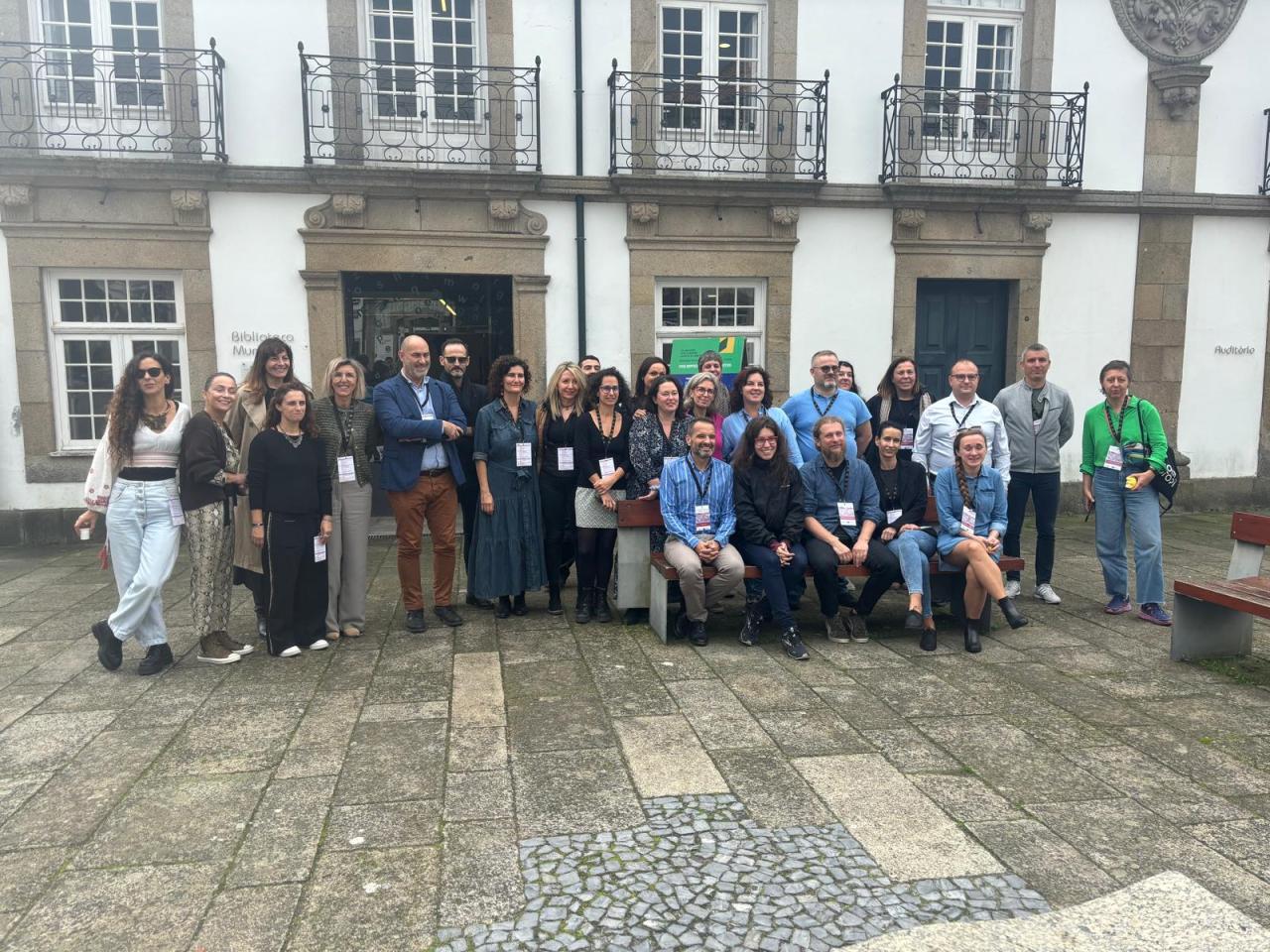The ARCHETHICS Network led by the Municipality of Cesena, has been fostering a deep reflection on Dissonant Heritage present in many European cities.
As the network has reached the mid-point of the journey, a session dedicated to the Mid Term Reflection has been provided during the 3rd Core Network Meeting held in Vila Nova de Cerveira (Portugal) on 5th and 6th November 2024. The Mid Term Review/Reflection (MTR) has been an important momentum for ARCHETHICS to provide timely space and tools for an open discussion between partners, URBACT Secretariat and experts.

From the Mid Term Reflection emerged a Network of committed cities that, despite working on the challenging topic dealing with dissonant heritage, has been able to well follow the Roadmap and decline locally the work done at transnational level. The big picture of the network is very positive. Highlights and difficulties were shared by cities. Here they are summarised.
Highlights
- Knowledge of Dissonant heritage improved. Cities involved in ARCHETHICS enhanced the knowledge and awareness of their citizens about Dissonant Heritage by organising site visits for stakeholders, lectures with experts and University researches as well as testing activities in Dissonant heritage sites.
- Community engaged on Dissonant Heritage experiences. Local communities demonstrated interest in being engaged in activities dealing with dissonant heritage both for sharing storytelling as well as urban regeneration and place making projects.
- Active members of URBACT Local Group. Despite Dissonant Heritage cannot be considered a mainstreaming topic, the URBACT Local Group (ULG) members involved in ARCHETHICS project are very committed and active to promote changes and actions to be implemented in dissonant heritage sites. Moreover, the stakeholders involved in the process are diverse and surprisingly young.
- Positive impact of testing actions. Where it was possible to test activities in Dissonant Heritage sites, the local community participated enthusiastically! The tests involved many people from the targeted neighbourhoods to share storytelling on dissonant heritage and experiment how dissonant heritage sites could be transformed and serve to people.
- Involvement of historical/cultural institutions/centres. Both at local and transnational level, ARCHETHICS has get in contact with experts, architects and historians working for Universities and Cultural Centres.
- Several cross-dissemination events. ARCHETHICS has implemented cross-dissemination activities with other EU networks and funded European projects working on the themes of dissonant heritage to strengthen the exchange of methods, approaches and network results. Among them: the Cesena’s Staff attended to the third edition of the OPEN BUZLUDZJA Festival, organizing an interactive workshop on the ARCHETHICS approaches and URBACT tools and methods and the EUI Policy Lab: leveraging culture for positive urban change to share the ARCHETHICS good practice within workshop “Echoes of the past into the future”.
- Novel projects and local activities started as ARCHETHICS follow-up. ARCHETHICS partners have been upscaling the project experience. The city of Permet joined a network for an EU Citizens, Equality, Rights and Values (CERV) programme to follow-up on dissonant heritage; Cesena implemented an online journey on dissonant architecture; Vila Nova de Cerveira applied for the URBACT Good Practice call and was awarded for a sport city initiative that involves elderly people.
- Constant collaboration with the Urban Agenda for EU - Action 10. ARCHETHICS has been collaborating continuously with the Action Group “Integrated Approaches to Dissonant Heritage” set up by the partnership of the Urban Agenda on Culture and Cultural Heritage (Action 10 - Dissonant Heritage). Exchange and learning have been provided every two months. The exchange and learning with other Researchers, Local Authorities and practitioners has been enriching the ARCHETHICS experience. The Network will contribute through its deliverables by enhancing the outputs developed by the Action Group.
- The ARCHETHICS Academy. It was set-up the “Archethics Academy”, a repository of practices and lectures on dissonant heritage shared by experts, activists, urban practitioners and communities representatives involved by ARCHETHICS. Here is the link to visit the Academy.

Difficulties encountered by ARCHETHICS
• Administrative changes
Due to local elections one city left the partnership and another one slowed down the project implementation. Dissonant heritage is a political and sensitive topic. In some cases local authorities prefer to not deal with dissonant heritage to avoid opposition.
• Political commitment
The political support for integrated urban development projects is the key to success for implementation. But not all city partners can count on the commitment of their local politicians. This impacts negatively both on the process of the Action Plan co-design and on the long term sustainability.
• Involvement of different municipal departments
Many cities of ARCHETHICS declared to find difficulties in involving other city departments as well as working through a cross departmental process.
• Lack of human resources to well follow the project
Some cities denounced the lack of human resources inside the municipality to properly follow the project.
• Stakeholder involvement
Despite many cities having achieved a good number of local stakeholders, other cities shared their problems in keeping a good engagement of local stakeholders. The reasons are: the meeting time, which does not agree with all participants; some stakeholders are still difficult to involve due to their commitments or lack of interest in dissonant heritage topics; the process seems too long for some stakeholders that want to see quick changes.
• No access to some DH sites
Some cities have to tackle the circumstances that dissonant heritage is not owned by municipalities. Some monuments are owned by National governments, in other cases the owners are private entities. Some sites are closed and the access is forbidden to the public, even the municipalities do not have the right to enter those dissonant heritage sites.
• Funding
Regenerating dissonant heritage sites require a huge amount of funds. Cities still do not have the needed economical resources to trigger a process of urban regeneration or adaptive reuse of the heritage.
• Improving the project communication at local level
The local communication needed to be improved to have better support from policy makers, engage missing stakeholders, keep the attention on dissonant heritage and avoid misinformation.

ARCHETHICS network designed how to tackle the difficulties through a set of small adjustments that will improve the project dynamic without revolutionising the whole roadmap. The most important are:
• The organisation of a Political Board Meeting for Policy Makers of ARCHETHICS cities with the delivery of a Political Manifesto/Charter for Dissonant Heritage, that will be organised in Krakow on 2 April 2025;
• A capacity building activity on funding strategies (EU funds, crowdfunding, etc) focusing on dissonant heritage;
• Creating an outline of a pilot digital archive of Dissonant Heritage at European level;
• Fostering tailored sessions on gender sensitive approach and green solutions for dissonant heritage;
• Following-up on the four Network dimensions: Ethics, People, Architecture and History, by sharing approaches and methodologies to involve young people and local communities as well as fostering experiences of architectural adaptive re-use and storytelling;
• Keeping active the URBACT Local Group coordinators board as a safe space for sharing lessons learnt, facilitation techniques, positive and negative issues. The coordinators are the key people that can tackle the emerging problems with local stakeholders and enhance the local project experience.


